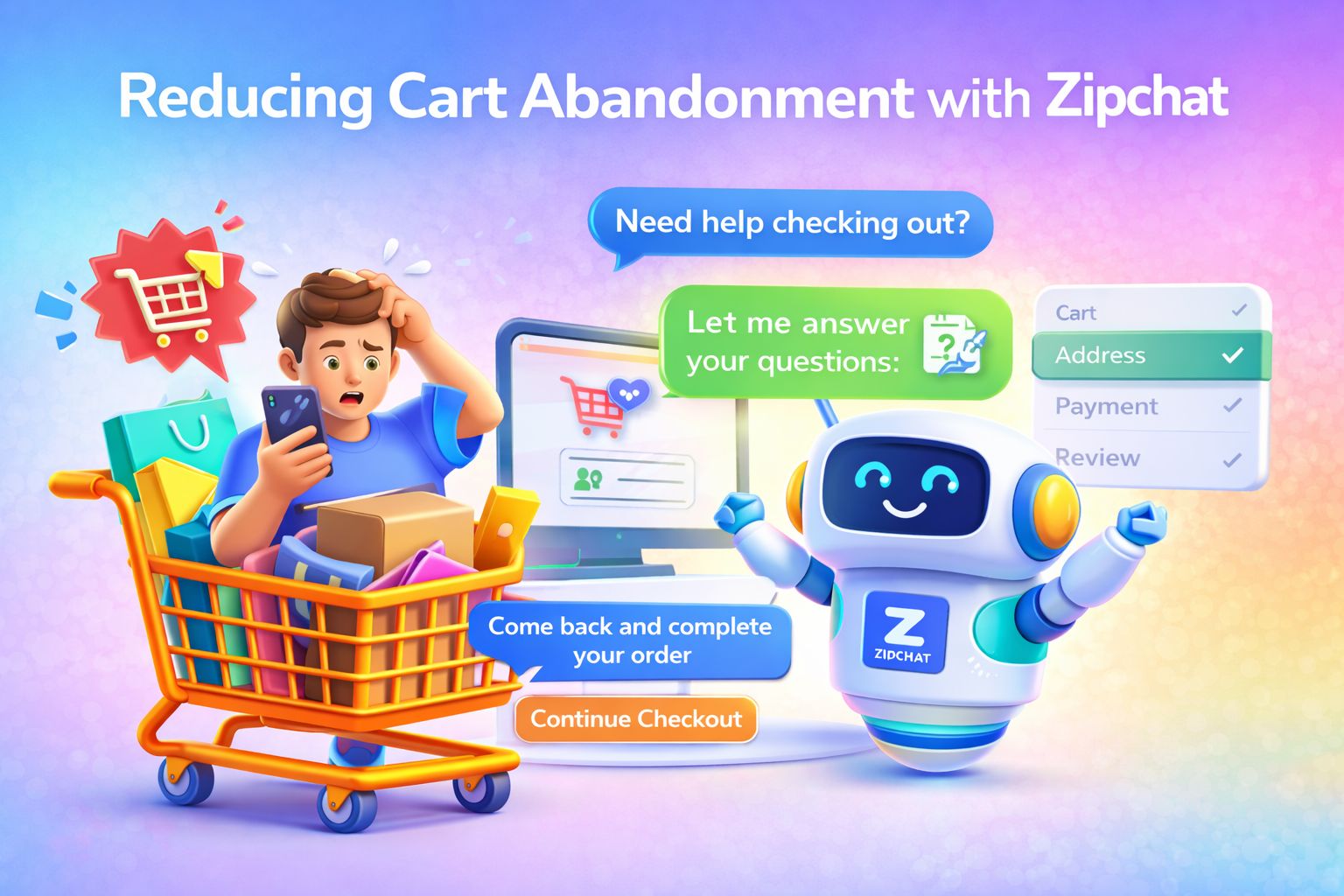Try Zipchat in Action!
Enter your store URL to see how Zipchat would behave.

In the ever-evolving world of online commerce, scaling your ecommerce business is crucial for long-term success. As your business grows, it is essential to adapt and expand your operations to meet the demands of a larger customer base. In this comprehensive guide, we will walk you through the process of scaling your ecommerce business, covering everything from understanding the importance of scaling to measuring the success of your efforts.
Understanding Ecommerce Scaling
Before we delve into the nitty-gritty of scaling your ecommerce business, it is important to understand why scale matters. Scaling is the process of increasing your business's capacity to handle growth, allowing you to meet increasing customer demand and achieve higher revenue.
The Importance of Scaling Your Ecommerce Business
Scaling your ecommerce business is not just about accommodating growth; it is essential for survival in a competitive marketplace. By scaling effectively, you can:
- Attract and retain more customers
- Increase revenue and profitability
- Gain a competitive edge
- Expand your market reach
However, scaling requires careful planning and execution to ensure sustainable growth. Let's explore key concepts in ecommerce scaling.
Key Concepts in Ecommerce Scaling
Scaling your ecommerce business involves more than just ramping up production. It requires a comprehensive approach that considers various aspects of your business. Here are some key concepts to keep in mind:
- Scalable Infrastructure: Ensure your website, servers, and backend systems can handle increased traffic and transactions.
- Streamlined Processes: Optimize your business processes to maximize efficiency and minimize bottlenecks.
- Effective Inventory Management: Implement inventory management systems to avoid stockouts or excess inventory.
- Automation: Leverage technology and automation to reduce manual tasks and improve productivity.
Scalable Infrastructure is a crucial aspect of ecommerce scaling. As your business grows, your website needs to be able to handle the increased traffic and transactions. Investing in a robust hosting solution and optimizing your website's performance can ensure a seamless shopping experience for your customers, even during peak times.
Streamlined Processes are essential for efficient and effective operations. By identifying and eliminating bottlenecks in your order fulfillment, customer service, and inventory management processes, you can improve overall productivity and customer satisfaction. Consider implementing software solutions that automate repetitive tasks and provide real-time data to streamline your operations.
Effective Inventory Management is vital to avoid stockouts or excess inventory. By implementing inventory management systems, you can track inventory levels, forecast demand, and optimize your purchasing and replenishment processes. This ensures that you have the right products in stock at the right time, minimizing the risk of lost sales or tying up capital in excess inventory.
Automation plays a significant role in ecommerce scaling. By leveraging technology, you can automate various aspects of your business, such as order processing, inventory management, and customer support. This not only reduces manual tasks but also improves accuracy and efficiency, allowing you to focus on strategic initiatives and providing exceptional customer experiences.
Preparing Your Ecommerce Business for Scaling
Before embarking on the journey of scaling your ecommerce business, it is crucial to evaluate your current business status and set clear goals for growth.

Scaling an ecommerce business involves more than just increasing sales; it requires a comprehensive strategy that considers various aspects of your operations. From inventory management to customer service, every part of your business must be ready to handle the growth that comes with scaling.
Evaluating Your Current Business Status
Take a closer look at your business's current performance, including sales metrics, customer feedback, and operational efficiency. Identify areas that require improvement or adjustment to support future growth.
Consider conducting a SWOT analysis to identify your strengths, weaknesses, opportunities, and threats. This analysis can provide valuable insights into areas where your business excels and areas that need attention before scaling.
Setting Goals for Ecommerce Scaling
Define specific and measurable goals for your ecommerce business. Consider factors such as revenue targets, customer acquisition, market share, and operational efficiency. These goals will serve as a roadmap for your scaling efforts.
It is essential to align your goals with your overall business strategy. Whether you aim to expand into new markets or increase customer retention, your scaling goals should support your long-term vision for the business.
Identifying Potential Challenges in Scaling
Scaling your ecommerce business is not without challenges. By identifying potential hurdles in advance, you can develop strategies to overcome them. Common challenges include:
- Supplier Constraints: Ensure your suppliers can meet increased demand as your business scales.
- Logistics: Evaluate your shipping and fulfillment processes to handle larger volumes efficiently.
- Customer Support: Prepare your customer service team to handle a higher volume of inquiries and ensure customer satisfaction.
Additionally, consider the impact of scaling on your website infrastructure. Ensure that your website can handle increased traffic and transactions without compromising speed or security. Investing in robust hosting solutions and optimizing your website's performance can help prevent downtime and ensure a seamless shopping experience for your customers.
Strategies for Ecommerce Scaling
Now that you have laid the groundwork for your scaling journey, let's explore some effective strategies to drive growth and expand your ecommerce business.

Enhancing Your Ecommerce Platform
Your ecommerce platform is the backbone of your online business. Invest in a scalable and user-friendly platform that can handle increased traffic, transactions, and product offerings. Ensure your website is optimized for mobile devices and provides a seamless shopping experience.
Consider customizing your platform to cater to the unique needs of your target audience. For example, if you sell luxury goods, you may want to create a visually stunning and immersive shopping experience that reflects the exclusivity of your products. On the other hand, if you offer budget-friendly items, focus on providing a straightforward and budget-conscious interface that makes it easy for customers to find what they need.
Optimizing Your Supply Chain
An efficient and robust supply chain is crucial for scaling your ecommerce business. Strengthen relationships with suppliers, negotiate favorable terms, and implement inventory management systems to avoid stockouts or overstocking. Streamline your order fulfillment process to ensure timely delivery to customers.
Consider exploring new sourcing options to diversify your supply chain and reduce dependency on a single supplier. This can help mitigate risks associated with disruptions in the global market or unforeseen events. Additionally, invest in technologies such as blockchain to enhance transparency and traceability in your supply chain, ensuring that your customers have confidence in the origin and quality of your products.
Expanding Your Market Reach
To achieve significant growth, consider expanding your market reach beyond your current target audience. Identify new customer segments or geographic markets that align with your product offerings. Utilize digital marketing strategies such as search engine optimization, social media advertising, and influencer partnerships to reach a broader audience.
When expanding into new markets, take the time to understand the cultural nuances and preferences of your target audience. Tailor your marketing messages and product offerings accordingly to resonate with local customers. Consider partnering with local influencers or experts who can help you establish credibility and gain traction in these new markets.
Leveraging Automation for Efficiency
Automation can be a game-changer when it comes to scaling your ecommerce business. Implement automation tools for tasks such as inventory management, customer support, and order processing. By reducing manual work, you can free up resources to focus on strategic initiatives.
Take advantage of artificial intelligence and machine learning technologies to personalize the customer experience. Use data analytics to gain insights into customer behavior and preferences, allowing you to offer tailored recommendations and promotions. Automation can also help you optimize your pricing strategy by dynamically adjusting prices based on market demand and competitor analysis.
By implementing these strategies, you can position your ecommerce business for sustainable growth and success in the ever-evolving digital landscape.
Boosting Conversion Rates and Enhancing Customer Experience with Zipchat AI
Zipchat AI is a powerful tool designed to significantly increase conversion rates and enhance the overall customer experience. By engaging visitors in real-time, Zipchat AI provides personalized assistance that can guide customers through their buying journey, leading to higher sales and improved customer satisfaction.
The AI chatbot also fosters returning customers by providing seamless and efficient support, resulting in increased positive reviews.
These positive experiences and reviews not only enhance your brand reputation but also play a crucial role in scaling your ecommerce business by attracting more customers and driving sustained growth. Discover the transformative potential of Zipchat AI here or on the Shopify App Store.
Financial Considerations in Ecommerce Scaling
Scaling your ecommerce business requires financial planning and management. Let's explore the key financial considerations involved.
Expanding an ecommerce business involves more than just increasing sales. It requires a strategic approach to budgeting, understanding return on investment, and managing cash flow effectively to support growth sustainably.
Budgeting for Scaling
Develop a detailed budget that factors in the costs associated with scaling your ecommerce business. Consider expenses such as technology upgrades, marketing campaigns, hiring additional staff, and infrastructure enhancements. It's crucial to account for both one-time investments and ongoing operational costs to ensure a realistic financial plan.
Moreover, consider setting aside a contingency fund to address unexpected expenses that may arise during the scaling process. This buffer can provide financial security and flexibility as you navigate the challenges and opportunities that come with business growth.
Understanding the ROI of Scaling
Calculate the return on investment (ROI) of your scaling efforts to ensure they are delivering the expected results. Regularly evaluate key performance indicators (KPIs) such as revenue growth, customer acquisition cost, and customer lifetime value to assess the financial impact of your scaling strategies. By tracking and analyzing these metrics, you can make data-driven decisions to optimize your financial performance.
Furthermore, consider conducting scenario analysis to assess the potential outcomes of different scaling strategies. By modeling various scenarios and their financial implications, you can make informed decisions that align with your business objectives and risk tolerance.
Managing Cash Flow During Scaling
Scaling your ecommerce business may require upfront investments that can strain your cash flow. Develop a cash flow management plan to ensure you have sufficient resources to support your scaling initiatives without compromising regular operations. Monitor your cash flow closely, identify potential bottlenecks, and proactively address any cash flow challenges to maintain financial stability.
Additionally, explore financing options such as lines of credit, business loans, or investor partnerships to supplement your cash flow and fund growth opportunities. By diversifying your sources of capital, you can mitigate financial risks and seize strategic opportunities for scaling your ecommerce business.
Maintaining Quality While Scaling
Scaling your ecommerce business should not come at the expense of quality. It is crucial to prioritize customer service excellence and maintain product quality and consistency throughout the growth process. By focusing on these aspects, you can ensure customer satisfaction and build a strong reputation in the market.

Expanding your ecommerce business is an exciting journey that presents numerous opportunities for growth and success. However, it is essential to navigate this expansion thoughtfully to avoid compromising the quality that sets your brand apart. By implementing strategic measures and staying true to your core values, you can scale your business effectively while upholding the standards that define your brand.
Ensuring Customer Service Excellence
As your customer base expands, it becomes even more important to provide exceptional customer service. Implement strategies such as prompt response times, personalized communication, and proactive issue resolution to keep your customers satisfied. Monitor customer feedback and leverage it to continuously improve your service. By prioritizing customer service excellence, you can foster loyalty and trust among your clientele, leading to repeat business and positive word-of-mouth referrals.
Furthermore, investing in training programs for your customer service team can enhance their skills and empower them to deliver top-notch support. By equipping your staff with the tools and knowledge needed to address customer inquiries effectively, you can ensure consistent service quality across all touchpoints.
Maintaining Product Quality and Consistency
Consistency is key when scaling your ecommerce business. Ensure that your products maintain the same level of quality and meet customer expectations as you increase production. Regularly monitor product quality, maintain supplier relationships, and conduct thorough quality control checks to uphold your brand reputation. By establishing stringent quality assurance processes and fostering collaboration with trusted suppliers, you can uphold the standards that define your brand and instill confidence in your customers.
Moreover, embracing innovation in product development can enable you to enhance the quality and appeal of your offerings. By staying attuned to market trends and consumer preferences, you can introduce new features or improvements that set your products apart from competitors, driving customer loyalty and engagement.
Balancing Growth and Business Stability
While scaling your ecommerce business, it is important to strike a balance between growth and business stability. Rapid growth can bring challenges such as operational inefficiencies or cash flow constraints. Continuously evaluate the scalability of your infrastructure and adjust your strategies to maintain a stable foundation as you grow. By proactively addressing potential bottlenecks and optimizing your business processes, you can sustain long-term growth while safeguarding the financial health of your enterprise.
Furthermore, fostering a culture of adaptability and resilience within your organization can help you navigate unforeseen challenges and market fluctuations. By encouraging a growth mindset and promoting collaboration among team members, you can build a robust foundation that supports sustainable expansion and business success.
Measuring the Success of Your Scaling Efforts
Scaling your ecommerce business is an ongoing process. To ensure your efforts are fruitful, it is crucial to measure the success of your scaling strategies and make necessary adjustments along the way.
When it comes to measuring the success of your scaling initiatives, key performance indicators (KPIs) play a vital role. These KPIs act as a compass, guiding you towards your goals and helping you understand the impact of your strategies. Let's take a closer look at some important KPIs to consider:
1. Revenue Growth
Revenue growth is a fundamental metric that reflects the financial success of your scaling efforts. By tracking your revenue growth over time, you can assess the effectiveness of your strategies and identify areas for improvement. Keep a close eye on this KPI to ensure your business is heading in the right direction.
2. Customer Acquisition Cost
Customer acquisition cost (CAC) is another crucial KPI to monitor. It measures the amount of money you spend on acquiring new customers. By analyzing your CAC, you can determine the efficiency of your marketing and advertising campaigns. Lowering your CAC while maintaining a steady stream of new customers is a clear sign of successful scaling.
3. Conversion Rate
The conversion rate is the percentage of website visitors who take a desired action, such as making a purchase. Monitoring your conversion rate is essential for understanding how well your website and marketing efforts are performing. A higher conversion rate indicates that your scaling strategies are resonating with your target audience.
4. Average Order Value
The average order value (AOV) measures the average amount of money customers spend per order. Increasing your AOV is a great way to boost revenue without acquiring additional customers. By analyzing your AOV, you can identify opportunities to upsell or cross-sell, ultimately driving higher profits.
5. Customer Lifetime Value
Customer lifetime value (CLV) is a metric that predicts the total revenue a customer will generate throughout their relationship with your business. By understanding your CLV, you can make informed decisions about customer retention and loyalty programs. Increasing your CLV indicates that your scaling efforts are not only attracting new customers but also fostering long-term relationships.
Regularly analyzing these metrics will provide you with valuable insights into the effectiveness of your scaling strategies. Armed with this data, you can make data-driven decisions and fine-tune your approach to achieve even greater success.
Regular Review and Adjustment of Scaling Strategies
Scaling your ecommerce business is a dynamic process that requires continuous evaluation and adjustment. It's not enough to implement a strategy and hope for the best. Regularly reviewing your scaling strategies is essential to ensure they are still aligned with your business goals and market conditions.
Take the time to assess the impact of your strategies and make necessary modifications. This could involve tweaking your marketing campaigns, optimizing your website for better user experience, or exploring new channels for customer acquisition. By staying proactive and adaptable, you can stay ahead of the competition and maintain a strong position in the market.
Long-Term Success in Ecommerce Scaling
Achieving long-term success in scaling your ecommerce business requires a strategic and adaptable approach. It's not just about implementing short-term tactics; it's about building a solid foundation for sustained growth.
Staying informed about industry trends, customer preferences, and emerging technologies is crucial. Keep a finger on the pulse of your industry and be ready to embrace change. Continuously innovate to stay ahead of the curve and invest in your team's skills to ensure they have the knowledge and expertise to support your scaling efforts.
Additionally, fostering a culture of agility within your organization is essential. Encourage your team to think creatively, adapt quickly to new challenges, and embrace a growth mindset. By cultivating a culture of agility, you can create an environment that thrives on change and innovation.
Scaling your ecommerce business can be a challenging endeavor, but with careful planning, strategic implementation, and a relentless focus on customer satisfaction, you can unlock new levels of success. Use this comprehensive guide as your roadmap to navigate the complexities of scaling and propel your ecommerce business to new heights.
Take Your Ecommerce Scaling to the Next Level with Zipchat AI
Ready to revolutionize your ecommerce experience and see your conversion rates soar? Look no further than Zipchat AI, the most powerful AI Chatbot designed specifically for Ecommerce. Engage with your store visitors like never before, boost your sales, and provide exceptional customer support with ease. Merchants using Zipchat AI enjoy an impressive average 13.4% Chat-to-Sale conversion rate. Don't miss out on this game-changing tool. Start your 7-Day Free Trial today and begin your journey to ecommerce excellence!








